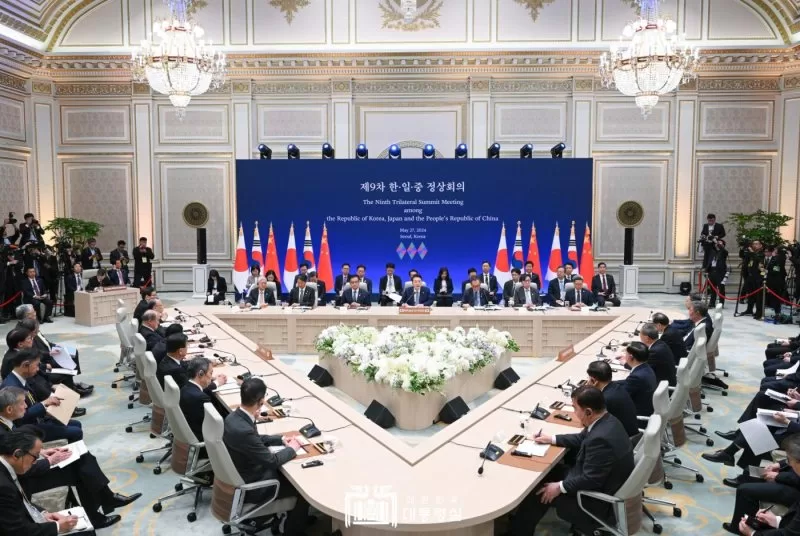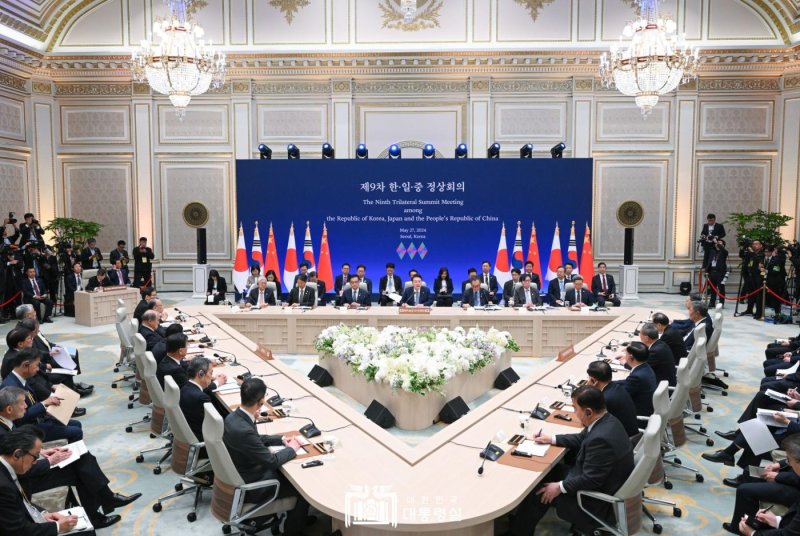North Korea issued a response to a trilateral summit between South Korea, Japan and China on Monday, warning that any efforts to interfere with its nuclear weapons program would lead to “hastened war.” Photo courtesy of South Korean President’s office
SEOUL, May 28 (UPI) — North Korea angrily responded to a trilateral summit by South Korea, Japan and China, calling it a “grave political provocation” that would speed up a military confrontation, in a message that Seoul speculated Tuesday is directed toward the North’s closest ally, Beijing.
South Korean President Yoon Suk Yeol, Japanese Prime Minister Fumio Kishida and Chinese Premier Li Qiang held the summit in Seoul on Monday and reaffirmed their commitment to peace and stability on the Korean Peninsula.
“If anyone tries to deny or violate the constitutional position of our country as a nuclear weapons state … it will be regarded as the most serious infringement upon sovereignty,” the North Korean Foreign Ministry said in a statement posted hours after the summit.
The North’s statement cited the trilateral summit and called its discussion of denuclearization “a blatant challenge to the sovereignty of the DPRK and wanton interference in its internal affairs.”
The Democratic People’s Republic of Korea is the official name of North Korea.
“Denuclearization on the Korean peninsula means a power vacuum and hastened war,” the statement, carried by Korean Central News Agency, said.
The summit, the first in more than four years among the Northeast Asian neighbors, stopped short of explicitly calling for the North to abandon its nuclear weapons program.
“We reiterated positions on regional peace and stability, denuclearization of the Korean Peninsula and the abductions issue, respectively,” the joint statement said.
South Korea’s Unification Ministry, which oversees inter-Korean affairs, suggested Tuesday the isolated regime was signaling its displeasure with Beijing, its main ally and chief trade partner.
“Though the North’s rebukes were focused on the South, it was rare for North Korea to publicly denounce a (diplomatic) meeting attended by China,” a ministry official told local reporters on the condition of anonymity, according to news agency Yonhap.
China has not overtly supported the North’s nuclear weapons program but is widely believed by international observers to be helping Pyongyang skirt punishing economic sanctions.
At the same time, Beijing has not thrown its full weight behind a burgeoning alliance between North Korea and Russia that the United States and allies claim is resulting in weapons sales and technology transfers.
North Korea’s strong reaction “clearly shows that the joint declaration of the ROK-Japan-China summit was meaningful,” a South Korean foreign ministry spokesman said Tuesday.
“As confirmed by numerous U.N. Security Council resolutions, North Korea’s complete abandonment of nuclear weapons and its denuclearization are the consensus and unified goal of the international community,” ministry spokesman Lim Soo-suk said at a press briefing.
“North Korea will never be recognized as having nuclear weapons,” Lim added. “Recognizing that North Korea’s nuclear and missile development will only undermine its own security and economic development, we urge North Korea to return to the path of denuclearization as soon as possible.”
North Korea also attempted to place a reconnaissance satellite into orbit on Monday hours after the summit, in defiance of international warnings and in violation of U.N. Security Council resolutions. The launch failed when a newly developed rocket engine exploded in flight.

